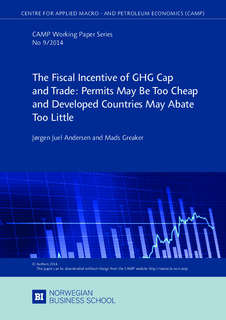| dc.contributor.author | Andersen, Jørgen Juel | |
| dc.contributor.author | Greaker, Mads | |
| dc.date.accessioned | 2014-12-18T14:22:32Z | |
| dc.date.available | 2014-12-18T14:22:32Z | |
| dc.date.issued | 2014 | |
| dc.identifier.issn | 1892-2198 | |
| dc.identifier.uri | http://hdl.handle.net/11250/227865 | |
| dc.description.abstract | The theoretical justification for a greenhouse gas (GHG) cap and trade system is that
participants will trade emission permits until their marginal cost of abatement equals the
equilibrium price of emission permits. However, for fiscally constrained governments this logic
does not apply, as they have a fiscal incentive to let welfare concerns, rather than industrial
cost efficiency, guide their abatement policy. Then, global cost efficiency will fail even if just a
(small) subset of governments are fiscally constrained. Finally, we argue that any institutional
change which breaks the connection between a government's abatement policy and its budget
will increase welfare. | nb_NO |
| dc.language.iso | eng | nb_NO |
| dc.publisher | BI Norwegian Business School | nb_NO |
| dc.subject | environmental policy, fiscal incentive, fiscal constraints, GHG cap and trade, welfare | nb_NO |
| dc.title | The fiscal incentive of GHG cap and trade: Permits may be too cheap and developed countries may abate too little | nb_NO |
| dc.type | Working paper | nb_NO |
| dc.source.pagenumber | 28 pages | nb_NO |
